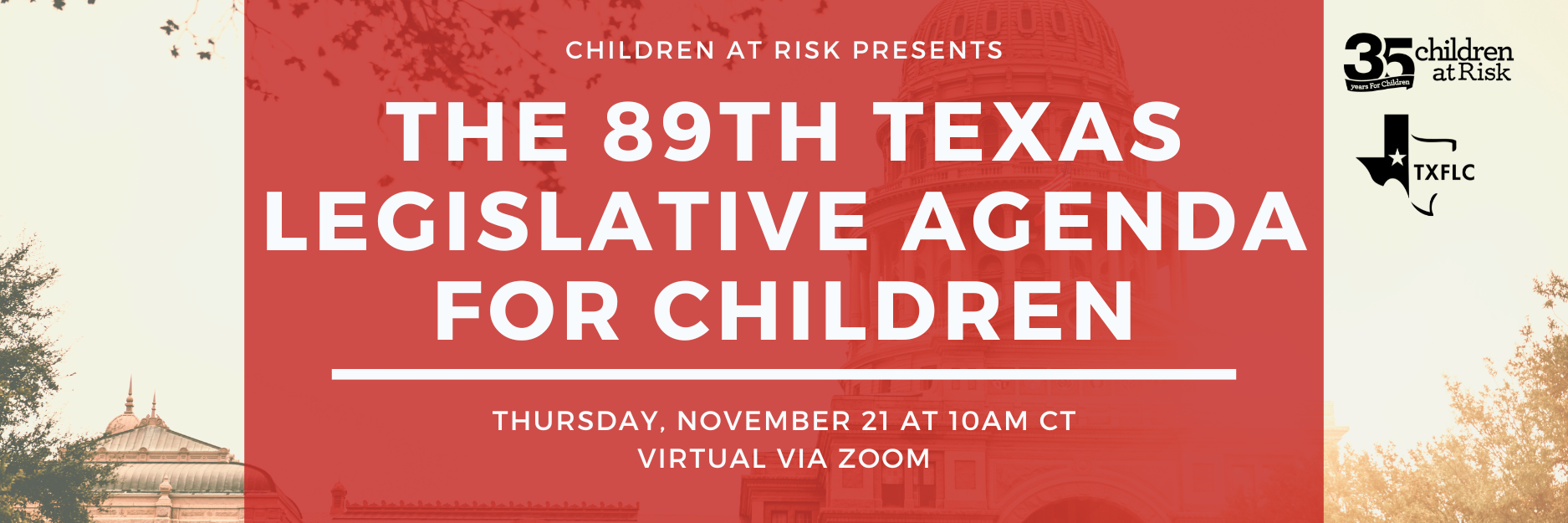
This post was written by Briauna Derry, Director of Media Activism, CHILDREN AT RISK.
On November 21, CHILDREN AT RISK, in partnership with the Texas Family Leadership Council, hosted the 89th Texas Legislative Agenda for Children Summit, bringing together experts, advocates, and policymakers to set priorities for Texas children and families, while unveiling CHILDREN AT RISK’s Policy Agenda for the 89th Texas Legislative Session in 2025.
The summit opened with powerful remarks from Dr. Bob Sanborn, President and CEO of CHILDREN AT RISK, who highlighted the urgency of addressing child poverty and inequities through unified action. Mandi Sheridan-Kimball, Vice President and Director of Government Affairs, followed by laying the groundwork for the day’s discussions, emphasizing the legislative priorities that will guide our advocacy efforts in the months ahead.
“We have a great amount of kids in our state, and that comes with a great responsibility to take care of them and ensure they have access to quality, reliable child care,” said Kofron. “Families can’t afford to pay any more, and providers can’t afford to pay any less.”
Throughout the day, leading experts presented thought-provoking insights across key policy areas:
Caroline Roberts emphasized the critical importance of reconnecting Texas youth to education and the workforce, drawing attention to the state’s higher-than-average rate of disconnected youth. “These young people are essential to the future of our workforce and economy,” she noted, urging collaboration to foster long-term success.
Kim Kofron addressed the challenges surrounding early childhood education, particularly the steep costs of child care that burden many families. “Most families spend 10-50% of their income on infant and toddler care, far above the federal recommendation of 7%,” she explained. Kofron also highlighted progress in the Texas Rising Star program and called for continued investments to strengthen early education.
Health policy experts Clayton Travis and Jamie Olson spotlighted the intersection of health and child well-being, from the increase in child hunger during summer months to the role of organizations in preventing infectious diseases. Their insights underscored the need for coordinated efforts to support children’s physical and mental health.
Jonathan Feinstein discussed the importance of equitable resource allocation in K-12 education, emphasizing the significant costs associated with teacher turnover and the urgent need for a strong, well-supported teaching workforce.
Linda Corchado shared an inspiring perspective on how schools and communities are collaborating to support emergent bilingual students and children of immigrants. “When schools work hand-in-hand with refugee groups, they create a powerful blueprint for addressing challenges and building supportive networks,” she shared.
The summit also showcased the critical role of private sector engagement in advancing child-centered policies. Moderated by Donald Bowers, Vice President of the Federal Reserve Bank of Dallas, the panel featured insights from Chris Wallace, Ed Wolff, and Doe Florsheim. Discussions focused on education, infrastructure, and housing affordability, with a shared commitment to creating equitable opportunities for all children. Wolff articulated it best: “Ensuring equitable education resources and early intervention sets children up for long-term success.”
The event concluded with a stirring call to action from Jason Sabo of Frontera Strategy. He urged attendees to remain steadfast in their advocacy, emphasizing that the ideas and collaborations fostered during the summit would drive meaningful change for Texas children and families.
The 89th Texas Legislative Agenda for Children underscored the power of unified advocacy and collective action. As we approach the 89th Texas Legislative Session, the partnerships and ideas formed during this event will serve as a powerful catalyst for progress. Together, we can create a Texas where every child has the support, resources, and opportunities they deserve. This is not the end of our work—it is just the beginning of a shared journey toward a brighter, more equitable future for all Texas children and families.
WATCH THE RECORDING
READ MORE FROM C@R
C@R Interview Series: Education Leadership Conversations
1:1 Interviews to offer Insights on Texas Public Schools, Student Achievement, and Education Policy Media Contacts: Morgan Gerri, 832.600.9354 Rashena Franklin 713.301.4577 November through December 2025, CHILDREN AT RISK will host a Education Leadership Conversation...
Press Conference: Healthcare Costs Set to Rise for All Children and Families
Over a million Texans are on the brink of losing their healthcare coverage, skyrocketing costs in healthcare for all Americans Media Contacts:Morgan Gerri, 832.600.9354Rashena Franklin, 713.301.4577 TEXAS (November 20, 2025) – Texas already ranks as the highest...
2024-2025 Houston School Rankings
CHILDREN AT RISK Releases 2024-2025 Annual Houston School Rankings HOUSTON (Monday, November 10, 2025) – For over two decades, CHILDREN AT RISK has released its annual Texas School Rankings to spotlight academic excellence, support family decision-making, and drive...
From Harm to Hope: 2025 National Immigration Summit Highlights Pathways to Protection and Empowerment
The virtual gathering brought together national and state advocates, researchers, and community leaders for a timely conversation about how immigration policies are shaping children’s lives—and how advocacy can drive lasting change. On September 25, CHILDREN AT RISK,...
Two Years of Impact: Celebrating the Commitment and Progress of Harris County’s Early Learning Quality Network
OCTOBER 10, 2025 Written by Briauna Derry, Director of Media Activism, CHILDREN AT RISK Two years ago today, on October 10, 2023, Harris County Department of Economic Equity and Opportunity’s Early Learning Quality Network (ELQN) was launched with a clear mission: to...
CHILDREN AT RISK Public Statement: Children and Families Need Certainty, Not Chaos
Media Contacts: Morgan Gerri, 832.600.9354 Rashena Franklin, 713.301.4577 FOR IMMEDIATE RELEASE October 1, 2025 CHILDREN AT RISK is deeply concerned that today’s government shutdown is putting children and families at risk. Essential programs that millions rely...




